Crucial Nourishment for Brain and Liver Well-being: Choline
Essential Nutrient Choline Crucial for Brain and Liver Health
Choline, an often overlooked yet vital nutrient, plays a crucial role in maintaining the health of both the brain and liver. This essential compound is crucial for several bodily functions, particularly for cognitive performance and liver function.
Choline is primarily absorbed in the small intestine, and its efficiency can vary based on individual dietary intake and genetic factors. As a result, choline supplementation can be an effective strategy to ensure adequate choline levels, especially for those with specific dietary restrictions or genetic predilections that may hamper choline absorption.
Research has shown that choline supplementation can significantly improve liver function, reducing the risk of liver disease. In addition, it is essential for the production of neurotransmitters, which are critical for brain function and maintaining a healthy nervous system.
The impact of choline on brain health is profound. Choline aids in preserving memory, enhancing cognition, and promoting cognitive performance, among other benefits. It plays a key role in the creation of acetylcholine, a neurotransmitter responsible for various brain functions, including memory, mood, muscle control, and other nervous system activities.
In essence, choline bolsters brain health and contributes significantly to overall well-being. Among the top dietary sources of choline are eggs, lean meats, and seafood. However, not everyone's diet includes these foods, making it essential to explore alternative sources, such as quinoa, tofu, and broccoli, which are also choline-rich.
A deficiency in choline can lead to serious health consequences, including impaired memory or cognition, liver abnormalities, heart disease, developmental complications in infants, and an increased risk of neurological disorders. By integrating choline into their diet, individuals can cater to their body's requirements and mitigate the risk of potential health complications.
Remember, everyone is on a health journey, and understanding the importance of maintaining an adequate choline intake can help foster a sense of belonging and mutual support within our communities. By sharing this information, we can work together towards a healthier lifestyle.
Related Posts:- Nurturing Brain Health: Mitochondria, Free Radicals, and Antioxidants- The Impact of ADHD on Academic Achievement: Research Findings- Personalised Biohacking Interventions: Tailoring Health Optimisation To Your Unique Needs- Lifestyle Changes For Neuroprotection and Cognitive Well-Being- Rethinking Medicine: The Power of Light and Community- Brain and Heart Health: The Connection for Overall Wellbeing- Unlocking Weight Loss Potential: Exploring African Mango- Bipolar Disorder: Managing Mood Swings and Enhancing Quality of Life
Enrichment Data:- Choline is a crucial nutrient for maintaining optimal brain and liver health. Its role in cognitive function and liver performance substantiates its importance in our diet.- Animal-based foods, such as beef liver, eggs, fish, chicken, and beef, are promising dietary sources of choline.- Plant-based foods, including soybeans, legumes, broccoli, Brussels sprouts, and mushrooms, also contribute to choline intake.- Supplements like lecithin, phosphatidylcholine, Alpha-GPC, Citicoline, and Betaine can help meet choline needs.- Choline is essential for brain health because it is a precursor to acetylcholine, a neurotransmitter involved in memory, mood regulation, and muscle control.- Maintaining adequate choline intake is important for preventing liver-related health issues.
- To maintain optimal brain and liver health, it's crucial to ensure an adequate dietary intake of choline, an essential nutrient that plays a critical role in cognitive function and liver performance.
- For those with specific dietary restrictions or genetic predilections that may hamper choline absorption, supplements like lecithin, phosphatidylcholine, Alpha-GPC, Citicoline, and Betaine can prove beneficial in meeting choline needs.
- Plant-based foods, such as broccoli, Brussels sprouts, soybeans, and legumes, are also relevant sources of choline, contributing to a balanced diet and overall health-and-wellness.
- A deficiency in choline can lead to serious health consequences, including impaired memory or cognition, liver abnormalities, heart disease, developmental complications in infants, and an increased risk of neurological disorders.
- Integrating choline into a healthy diet can help individuals cater to their body's requirements and mitigate the risk of potential health complications, ultimately bolstering brain health and contributing significantly to overall well-being.







